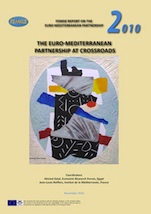 What progress has been made since the Barcelona process was launched 15 years ago, and what margins do signatory countries to the process have? The Femise study “The Euro-Mediterranean partnership at the crossroads” examines all signatory countries to the process in close detail.
What progress has been made since the Barcelona process was launched 15 years ago, and what margins do signatory countries to the process have? The Femise study “The Euro-Mediterranean partnership at the crossroads” examines all signatory countries to the process in close detail.
Where are we in the process? Fifteen years after the Barcelona process, customs tariffs on imports of European goods imported countries south of the Mediterranean Sea remain just as high, whereas Europe has still not opened its borders to fruits and vegetables grown in the Maghreb. The deregulation of services has not occurred, and there is still much scope for progress in the knowledge economy.
The first chapter of “The Euro-Mediterranean partnership at the crossroads”, the most recent publication by Femise published in November 2010, attributes these failings to a lack of transparent administration. The uprising of the Tunisian people against President Ben Ali and the Trabelsi family lends support to this thesis.
Femise economists also analysed capital flows between 2004 and 2009. Foreign direct investment (FDI) and capital flows appear to be very limited precisely due to this corruption in government and political instability.
“The financial sector must undergo reform. Banks play a crucial role in economic development, in that they are the main source of finance for the private sector”, write the economists at Femise.
Improvements in health and education systems
They advocate the need for financial integration in the Euromed region in order to facilitate the mobility of capital flows.
“The central banks of the Mediterranean must increase the coordination of their respective monetary policies”, they add. Moreover, the absence of stock exchanges acts as a brake on development and growth. Under these conditions, it is impossible to raise funds.
Before the Tunisian crisis, experts had predicted a fall in exports and deposits and a sharp decline in FDI for 2011. Now, there is also the risk of investors repatriating their capital if contagion spreads to other countries in the Maghreb.
In terms of the mobility of labour, economists at Femise are preparing an admission of failure and have put forward strategies to promote this mobility between countries in the Mediterranean. “Migration policies must be integrated into development strategies (…) and qualifications and skills recognised”, the report emphasises.
The last chapter of the document contains a detailed poverty map of the Mediterranean (Egypt, Algeria, Tunisia, Lebanon, Israel, Turkey, Syria and Morocco) and of the strengths and weaknesses of each state.
While some of these countries have embarked on important reforms, pockets of poverty in rural areas have yet to be reduced. Improvements in health and education systems could enable them to emerge from the impasse, as could increases in productivity in agriculture.
The 2010 edition of the “FEMISE Annual Report on the Euro-Mediterranean Partnership” is available on the Femise website.
Article by Nathalie Bureau du Colombier, Econostrum. It belongs to a series of articles published in the context of the partnership between Econostrum and Femise for the year 2011. These articles also feed the “Grand Angle” part of the Econostrum Website. You can find this topic and all information at the following address: www.econostrum.info. Registration for the Econostrum newsletter is available here:http://www.econostrum.info/subscription/


